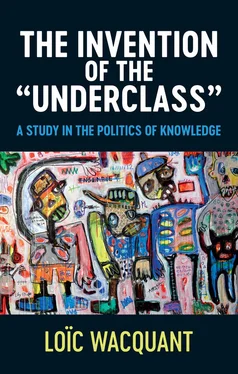1 Cover
2 Front Matter At century’s close, American social scientists, policy analysts, philanthropies and politicians became obsessed with a fearsome and mysterious new group said to be ravaging the ghetto: the urban “underclass.” Soon the scarecrow category and its demonic imagery were exported to the United Kingdom and continental Europe and agitated the international study of exclusion in the postindustrial metropolis. In this punchy book mating intellectual history, participant observation, and conceptual analysis, Wacquant retraces the invention and metamorphoses of this racialized folk devil, from the structural conception of Swedish economist Gunnar Myrdal to the behavioral notion of Washington think-tank experts to the neo-ecological formulation of sociologist William Julius Wilson. He uncovers the springs of the sudden irruption, accelerated circulation, and abrupt evaporation of the “underclass” from public debate, and reflects on their implications for the social epistemology of urban marginality. What accounts for the “lemming effect” that drew a generation of scholars of race and poverty over a scientific cliff? What are the conditions for the formation and bursting of “conceptual speculative bubbles”? What is the role of think tanks, journalism, and politics in imposing “turnkey problematics” upon social researchers? What are the special quandaries posed by the naming of dispossessed and dishonored populations in scientific discourse and how can we reformulate the explosive question of “race” to avoid these troubles? Answering these questions constitutes an exacting exercise in epistemic reflexivity in the tradition of Bachelard, Canguilhem and Bourdieu. And it leads to sounding a clarion call for social scientists to forge their own concepts and to defend their intellectual autonomy against the encroachments of outside powers, be they state officials, the media, think tanks, or philanthropies. Loïc Wacquant is Professor of Sociology at the University of California, Berkeley, and Researcher at the Centre de sociologie européenne, Paris. His books are translated in two dozen languages and include Urban Outcasts: A Comparative Sociology of Advanced Marginality (2008), Punishing the Poor: The Neoliberal Government of Social Insecurity (2009), and Body and Soul: Notebooks of an Apprentice Boxer (expanded anniversary edition, 2022).
3 Title Page The Invention of the “Underclass” A Study in the Politics of Knowledge Loïc Wacquant polity
4 Copyright Copyright © Loïc Wacquant 2022 The right of Loïc Wacquant to be identified as Author of this Work has been asserted in accordance with the UK Copyright, Designs and Patents Act 1988. First published in 2022 by Polity Press Polity Press 65 Bridge Street Cambridge CB2 1UR, UK Polity Press 101 Station Landing Suite 300 Medford, MA 02155, USA All rights reserved. Except for the quotation of short passages for the purpose of criticism and review, no part of this publication may be reproduced, stored in a retrieval system or transmitted, in any form or by any means, electronic, mechanical, photocopying, recording or otherwise, without the prior permission of the publisher. ISBN-13: 978-1-5095-5219-1 A catalogue record for this book is available from the British Library. Library of Congress Control Number: 2021946573 The publisher has used its best endeavours to ensure that the URLs for external websites referred to in this book are correct and active at the time of going to press. However, the publisher has no responsibility for the websites and can make no guarantee that a site will remain live or that the content is or will remain appropriate. Every effort has been made to trace all copyright holders, but if any have been overlooked the publisher will be pleased to include any necessary credits in any subsequent reprint or edition. For further information on Polity, visit our website: politybooks.com
5 Dedication Dedication To Bill Wilson, role model extraordinaire of intellectual courage
6 Endorsement Page “The history of the social sciences is and remains a continuous process passing from the attempt to order reality analytically through the construction of concepts – the dissolution of the analytical constructs so constructed through the expansion and shift of the scientific horizon – and the reformulation anew of concepts on the foundations thus transformed. It is not the error of the attempt to construct conceptual systems in general which is shown by this process – every science, even simple descriptive history, operates with the conceptual stock-in-trade of its time. Rather, this process shows that in the cultural sciences concept-construction depends on the setting of the problem, and the latter varies with the content of culture itself. . . . The greatest advances in the sphere of the social sciences are substantively tied up with the shift in practical cultural problems and take the guise of a critique of concept-construction.” Max Weber, “‘Objectivity’ in Social Science and Social Policy,” 1904
7 Prologue Prologue The sociologist may find a special instrument of epistemological vigilance in the sociology of knowledge, as the means of enhancing and clarifying the knowledge of error and of the conditions that make error possible and sometimes inevitable. Pierre Bourdieu et al., Le Métier de sociologue (1968) The Invention of the “Underclass” is an ethnographically grounded case study in the sociology and politics of knowledge. It draws on the conceptual history of Reinhart Koselleck and on the theory of symbolic power and fields of cultural production of Pierre Bourdieu to chart the stunning rise, multi-sited flourishing, and sudden demise of the urban “folk devil” of the closing decades of the twentieth century known as the underclass . 1 Fusing the trope of disorganization with the drive to exoticism, cycling in and out of the social sciences, journalism, and the political-policy-philanthropic field, this woolly and inchoate notion dominated the academic and public debate on race and poverty in the American metropolis roughly from 1977 to 1997. Its advocates, conservatives and liberals alike, claimed that the novel term was needed to capture an unprecedented development: the insidious incubation and cancerous growth of a subpopulation of the black poor, distinct from the traditional lower class, characterized by self-destructive behaviors, social isolation, and cultural deviancy, and responsible for the ravaging of the inner city. During this same period, the category and its demonic imagery were exported to the United Kingdom and continental Europe to agitate the international study of exclusion in the postindustrial metropolis.
Concepts matter Concepts matter It turns out, upon close scrutiny, that this “terministic screen” was not a reflection of reality so much as a deflection from reality. 2 The “underclass” started out as a proto-concept à la Robert K. Merton, that is, “an early, rudimentary particularized, and largely unexplicated idea,” 3 but quickly morphed into an instrument of public accusation and symbolic disciplining of the threatening black precariat in the hyperghetto – the novel sociospatial constellation that emerged from the rubble of the communal ghetto of the Fordist era. 4 It follows that the notion enters into the sociology of urban marginality, not as tool , but as object of analysis, and an object whose study has much to teach us about the political epistemology of dispossession and dishonor in the city as well as about the craft of concept-making more generally. Inspired by the Begriffsgeschichte of Reinhart Koselleck and the reflexive sociology of Pierre Bourdieu, 5 the present book offers a kind of “microhistory” of the “underclass,” centered on the period of its hegemony.
Читать дальше












